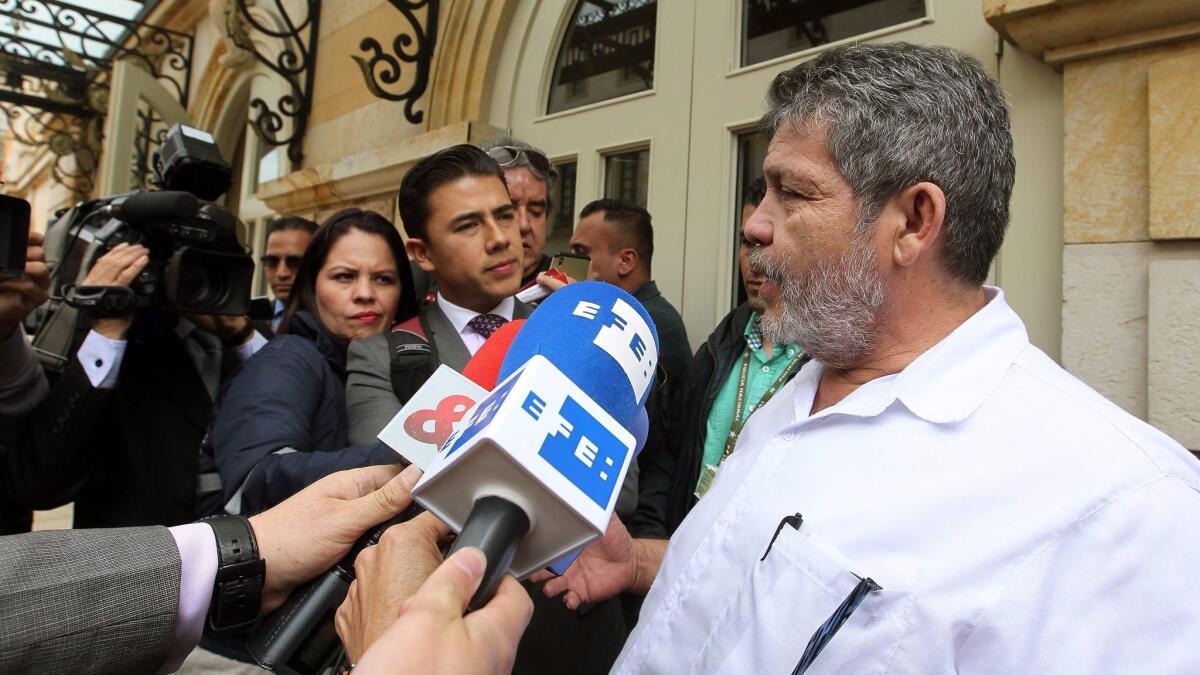Colombian government and rebels plan to sign new peace agreement despite opposition

Reporting from Bogota, Colombia â Colombian government officials and leftist rebels are expected to sign a revised peace deal Thursday before its submission to Congress for approval, provoking outrage from critics who want a nationwide referendum on any proposed agreement.
A previous proposal to end decades of fighting was rejected by voters in October, and many opponents â some favoring more punishment for the rebels â want a second referendum to determine whether there will be peace at last.
âThere are still fundamental issues that concern us, especially that rebel candidates will run for office without having paid for their crimes,â Conservative Party leader and former defense minister Marta Lucia Ramirez said Wednesday.
Government negotiators and representatives of the Revolutionary Armed Forces of Colombia, or FARC, this week agreed to a fresh accord as President Juan Manuel Santos faces increasing pressure to salvage a peace agreement.
Santos has a better chance of approval in Congress, where his allies control a solid majority of seats. A repeat of the Oct. 2 plebiscite in which voters narrowly rejected a deal with the rebels would be a much riskier affair in light of Santosâ dismal approval ratings among voters.
Opponents claimed that the initial peace deal was too generous to the FARC in allowing them to occupy 10 congressional seats and stipulating maximum sentences of house arrest even for the most flagrant war crimes. Many analysts interpreted the defeat as a personal rejection of Santos, who nevertheless was awarded the Nobel Peace Prize days after the vote.
Since the unexpected defeat, Santos has been grappling with how to revive the deal. He faces pressure on several fronts, including the legislative calendar. He has asked Congress to approve huge tax increases to help finance the cost of demobilizing and reintegrating disarmed rebels, when and if a peace deal goes into effect.
Also, some 300 United Nations peace monitors are in the country under an agreement to help supervise the relocation and disarming of rebels at 27 rural âconcentration zones.â But the U.N. commitment is only for 180 days. Moreover, the 2018 presidential campaign will begin soon, which will distract political players from the peace process.
In addition to the risks of putting the revised peace deal before voters with Santosâ approval rating at only 29%, another plebiscite would take months to stage because of the time required to pass enabling laws.
âAfter losing the first plebiscite, Santosâ chances of winning a second one are not all that good,â said professor Bruce Bagley at the University of Miami. âAnd while congressional approval might not be the legitimization heâd like for a nationwide mandate, itâs better than no mandate at all.â
After losing the plebiscite, Santos sent his negotiating team back to the bargaining table in Havana to meet with rebel leaders to try to incorporate hundreds of changes requested by opponents of the deal led by former President Alvaro Uribe, a fierce opponent of the peace deal.
On Nov. 12, Santos announced a ânew, better peace agreementâ that, among other changes, put greater restrictions on rebelsâ movements while under house arrest and forced them to face possible prosecution for war crimes before running for office.
But, after a Monday meeting with the governmentâs negotiating team to discuss the revisions, opponents claimed the changes were simply cosmetic âretouchesâ and too lenient, especially in guaranteeing political representation for the rebels.
In an address to the nation Tuesday night, Santos said that the revised deal, despite opposition from âradical sectors,â will be signed by both rebel and government leaders at a Thursday ceremony in Bogota. It then will go to Congress which ânot only counts on the legitimacy of the popular vote, it represents all provinces and regions of the country.â
Santos said rapid passage and implementation of the deal was imperative because of signs that a cease-fire in effect since July 2015 was breaking down.
Three rebels were killed in a confrontation with soldiers last week. More than a dozen human rights and community leaders pushing for victimsâ rights also have been gunned down by unknown assailants in recent weeks.
Santos said in his Tuesday speech that the new deal had drawn increased support from international leaders and domestic groups including âRoman Catholic and evangelical pastors, youth, victims and businesses âŚ. All have asked that we begin its implementation as soon as possible to give stability and security to the cease-fire and advance toward peace.â
But critics were quick to respond to Santosâ decision to give Congress the final say in the peace deal.
âThis is a coup dâetat,â said Oscar Ivan Zuluaga, a 2014 candidate for president and Uribe ally, referring to the upcoming congressional vote.
Michael Shifter, president of the Inter-American Dialogue in Washington, agreed that time was of the essence for Santos.
âThe cease-fire is fragile, and might not have been able to hold much longer,â Shifter said. âIt is unclear whether he would have won or lost another popular vote, but he just couldnât afford to risk that approach.â
Kraul is a special correspondent.
MORE WORLD NEWS
Inside the Indian IRS scam that cheated U.S. taxpayers out of millions
South Koreaâs political scandal leaves the country with abysmal options
Britainâs sweeping surveillance powers act raises concerns for human rights activists
More to Read
Sign up for Essential California
The most important California stories and recommendations in your inbox every morning.
You may occasionally receive promotional content from the Los Angeles Times.










